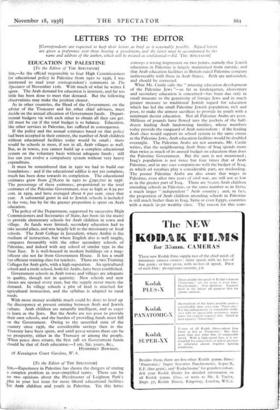EDUCATION IN PALESTINE
LETTERS TO THE EDITOR
[Correspondents are requested to keep their letters as brief as is reasonably possible. Signed letters are given a preference over those bearing a pseudonym, and the latter must be accompanied by the
• name and address of the author, which will be treated as confidential.—Ed. THE SPECTATOR [To the Editor of THE SPECTATOR]
StR,—As the official responsible to four High Commissioners for educational policy in Palestine from 192o to 1936, I was interested to read your correspondent's comments in The Spectator of November nth. With much of what he writes I agree. The Arab demand for education is insistent, and far too little has been done to meet that demand. But the following observations may make the position clearer.
As in other countries, the Head of the Government, on the advice of the Treasurer and his other chief advisers, must decide on the annual allocation of Government funds. Depart- mental budgets vie with each other to obtain all they can get. All must be cut if the total budget is to balance. Education, like other services in Palestine, has suffered in consequence.
If the policy and the annual estimates based on that policy had been accepted in their entirety, the number of Arab children without educational facilities today would be small ; there would be schools in most, if not in all, Arab villages as well. But, as in towns, you cannot build up a complete educational system on the voluntary basis without adequate funds ; still less can you evolve a compulsory system without very heavy expenditure.
It must be remembered that in 192o we had to build our
foundations.: and if the educational edifice is not yet complete, much has been done towards its completion. The educational estimates grew from £78,000 in 192o to £290,700 in 1936. The percentage of these estimates, proportional to the total estimates of the Palestine Government, rose as high as 6.59 per cent. in 1929, and have averaged about 6 per cent. since that year. A substantial grant in aid to Jewish schools is included in the vote, but by far the greater proportion is spent on Arab education.
The policy of the Department, supported by successive High Commissioners and Secretaries of State, has been (in the main) to provide elementary schools for Arab children in town and village. As funds were limited, secondary education had to take second place, and was largely left to the missionary or local schools. The Arab College in Jerusalem, where Arabic is the medium of instruction, but where English also is well taught, compares favourably with the other secondary schools of Palestine, and indeed with any school of similar type in the Near East. It is well-housed in modern buildings on a mag- nificent site not far from Government House. It has a small but efficient training class for teachers. There are two Training Colleges for Arab girls, with a high reputation. An agricultural school and a trade school, both for Arabs, have been established.
Government schools in Arab towns and villages are adequate in quality, though not in quantity. New schools and new classes are opened every year, but the supply never meets the demand. In village schools a plot of land is attached for agricultural instruction, and the syllabus is adapted to rural needs.
With more money available much could be done to level up the discrepancy at present existing between Arab and Jewish culture. Arab children are naturally intelligent, and as eager to learn as the Jews. But the Arabs are too poor to provide their own schools, and the burden of providing funds must fall on the Government. Owing to the unsettled state of the country since 1936, the considerable savings then in the Treasury have been spent, and until peace returns there can be no prosperity, either in the Treasury or among the people. When peace does return, the first call on Government funds should be that of Arab education.—I am, Sir, yours, &c.,
HUMPHREY BOWMAN.
28 Kensington Court Gardens, W. 8.
























































 Previous page
Previous page